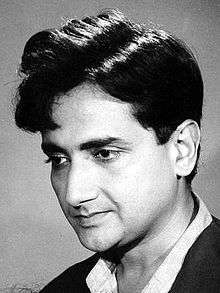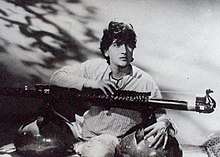Bharat Bhushan
Bharat Bhushan (14 June 1920 – 27 January 1992) was an Indian actor in Hindi language films, scriptwriter and producer, who is best remembered for playing Baiju Bawra in the 1952 film of the same name.[1] He was born in Meerut, and brought up in Aligarh, Uttar Pradesh.
Bharat Bhushan | |
|---|---|
 | |
| Born | 14 June 1920 |
| Died | 27 January 1992 (aged 71) |
| Nationality | Indian |
| Occupation | Actor |
| Years active | 1941–1992 |
| Known for | Baiju Bawra |
| Home town | Aligarh, Uttar Pradesh, India |
| Children | Anuradha Bhushan Aparajita Bhushan |
| Awards | Filmfare Best Actor Award (1955) |
Personal life
Bharat Bhushan was born on 14 June 1920 in a Vaishya (Baniya) family at Meerut, Uttar Pradesh.
His father, Raibahadur Motilal, was the government pleader of Meerut. His mother died when he was two years old. His elder brother was film producer Ramesh Chandra,[2] who owned the Ideal Studio at Lucknow. The brothers left for Aligarh to stay with their grandfather after their mother's death. He did his studies and earned a graduate degree from Dharam Samaj College, Aligarh. After this he took to acting against his father's wishes. He first went to Calcutta to join cinema and later established himself in Bombay.
He married into a prominent family in Meerut, Zamindar Raibahadur Budha Prakash's daughter Sarla. They had two daughters, Anuradha and Aparajitha. Anuradha had polio-associated complications. His other daughter Apararith played the role of 'Mandodari' in the famous TV show Ramanand Sagar's famous serial 'Ramayan'. In an interview, Aparajita had said that after the sudden demise of her husband, she turned to acting. Aparajita has done more than 50 films in her career. Bhushan's wife Sarla died of labour complications after delivering their second child in the early 1960s, soon after the film Barsaat Ki Raat. In 1967, he married actress Ratna, his co-star in the movie Barsaat Ki Raat.
Bharat Bhushan owned bungalows in Bandra, Bombay and other areas. He was an avid reader and boasted of his collection of books, which he had to sell off like his cars and bungalows in bad times, after he turned co-producer on the ploddings of his brother. Two of his films, 'Basant Bahar' and 'Barsaat ki Raat' were immensely successful, but the rest flopped.[3] He died after he escaped his financial crisis, on 27 January 1992.[4] [5]
Professional life
He made his debut with the Kidar Sharma hit Chitralekha (1941).[6] However, he struggled for over a decade to make a mark in Hindi movies till Baiju Bawra (1952), which gave him instant stardom and legendary status along with Mohammad Rafi, Meena Kumari and Naushad Ali. Though a very talented actor and a prominent star of the 1950s and 1960s in Hindi language films, he often took on roles of tragic musicians in the movies. Films in which he starred as lead actor include Basant Bahar.

"He portrays historical and mythological characters the best in Hindi movies," states contemporary actor-producer Chandrashekar. He wrote scripts and stories for Barsat Ki Raat, Nayi Umar Ki Nayi Fasal, Basant Bahar, Dooj Ka Chand, etc. He was the producer of Dooj Ka Chand. His brother R. Chandra made many films such as Bebus, Minar, and Basant Bahar.
He was the recipient of the second Filmfare best actor award for the film Shri Chaitanya Mahaprabhu in 1954. Most of the great songs of major singers of that period such as Rafi, Manna Dey, Talat, and Mukesh were pictured on him. He was the first chocolate-faced good-looking star of Hindi films. He was one of the few actors who had a good sense of music, so most music-based movies were made with him in lead roles in the 1950s and 1960s.
He acted in Hindi language movies until the 1990s. He is still loved and revered by the Indians for the great movies and great songs that he gave in spite of personal tragedies and stiff competition from his contemporaries. He is considered to be one of the greatest stars and legends of Hindi cinema.
Filmography
- Chitralekha (1941)
- Bhakta Kabir (1942)
- Bhaichara (1943)
- Sawan (1945)
- Suhaag Raat (1948)
- Rangila Rajasthan (1949)
- Udhaar (1949)
- Ankhen (1950)
- Bhai Bahen (1950)
- Janmashtami (1950)
- Kisi Ki Yaad (1950)
- Ram Darshan (1950)
- Hamari Shaan (1951)
- Saagar (1951)
- Baiju Bawra (1952)
- Maa (1952)
- Anand Math (1952)
- Paheli Shaadi (1953)
- Dana Pani (1953)
- Farmaish (1953)
- Ladki (1953)
- Shuk Rambha (1953)
- Shabaab (1954)
- Meenar (1954)
- Pooja (1954)
- Shri Chaitanya Mahaprabhu (1954)
- Kavi (1954)
- Dhoop Chhaon (1954)
- Aurat Teri Yehi Kahani (1954)
- Mirza Ghalib (1954)
- Amanat (1955)
- Basant Bahar (1956)
- Gateway of India (1957)
- Phagun (1958)
- Sawan (1959)
- Barsat Ki Rat (1960)
- Ghunghat (1960)
- Chandi ki Dewar (1960)
- Gyara Hazar Ladkian (1962)
- Sangeet Samraat Taansen (1962)
- Jahan Ara (1964)
- Dooj Ka Chand (1964)
- Naya Kanoon (1965)
- Taqdeer (1967)
- Pyar Ka Mausam (1969)
- Vishwas (1969)
- Gomti Ke Kinare (1972) as Bharat
- Kahani Kismat Ki (1973) as Doctor
- Ranga Khush (1975)
- Khoon Pasina (1977) as Kaka
- Unees-Bees (1980)
- Yaarana (1981)
- Umrao Jaan (1981) as Khan Saheb (Music Master)
- Adi Shankaracharya (1983)
- Nastik (1983) as Temple Priest
- Sharaabi (1984) as Masterji
- Phaansi Ke Baad (1985)
- Mera Saathi (1985)
- Ghar Sansar (1986)
- Maalamaal (1988) as Shri Mangatram's Manager
- Abhi To Main Jawan Hoon (1989)
- Chandni (1989) as Doctor
- Ilaaka (1989) as Man with suitcase
- Gharana (1989) as Radha's father
- Toofan (1989) as Priest in the Hanuman's temple
- Sheshnaag (1990)
- Majboor (1990) as Judge
- Baaghi (1990) as Asha Father
- Pyar Ka Devta (1991) as Doctor
- Humshakal (1992) as The Judge
- Aakhri Chetawani (1993)
Awards
- 1955 – Won, Filmfare Best Actor Award for Chaitanya Mahaprabhu
- 1956 – Nominated, Filmfare Best Actor Award for Mirza Ghalib
References
- Gangadhar, V. (17 August 2007). "They now save for the rainy day". The Hindu. Archived from the original on 8 October 2011. Retrieved 30 October 2013.
- "Archived copy". Archived from the original on 14 May 2019. Retrieved 14 May 2019.CS1 maint: archived copy as title (link)
- "Archived copy". Archived from the original on 14 May 2019. Retrieved 14 May 2019.CS1 maint: archived copy as title (link)
- Sabharwal, Gopa (2007). India Since 1947: The Independent Years. India: Penguin Books. ISBN 0143102745. Archived from the original on 12 April 2014. Retrieved 30 October 2013.
- Gangadhar, V (17 August 2007). "They now save for the rainy day". thehindu.com. Archived from the original on 20 May 2018. Retrieved 24 July 2018.
- Gulzar, p. 533
- Gulzar; Govind Nihalani; Saibal Chatterjee (2003). Encyclopaedia of Hindi cinema. Popular Prakashan. p. 335. ISBN 8179910660.